Presented in the Holy See Press Office the three-day event that will take place in the Umbrian city from Sept. 22 to 24; the last day will feature Pope Francis
source: EoF press office
Msgr. Sorrentino: "It would be nice to have the great ones of the earth alongside the EoF community". Sr. Smerilli: "EoF is not an event but a process already underway." The stories of those committed to a more equitable, supportive and fraternal global system.
VATICAN CITY - Everything is ready for "The Economy of Francesco," the international event that will take place in Assisi from Sept. 22 to 24 and involve a thousand young people from all over the world for a new economy on a human scale, for man. It is the third event, the first finally in presence, for young entrepreneurs, economists and changemakers designed to share new paths and sign, on the last day, a pact with the Holy Father. Since the launch of this initiative, Pope Francis has expressed his desire to meet the young people who for the past three years have been engaged in the process, which he himself wanted, of laying the foundations for a new economy, more just, equitable and fraternal.
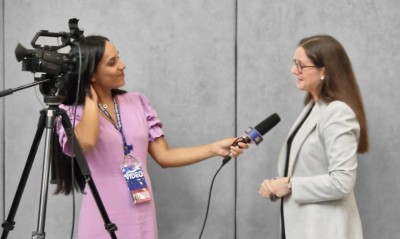 “The Economy of Francesco” was presented on the morning of Sept. 6, 2022, in the Holy See Press Office in the presence of H.E. Msgr. Domenico Sorrentino, Bishop of Assisi-Nocera Umbra-Gualdo Tadino and Foligno and Chairman of the "Economy of Francis" Organizing Committee; Sister Alessandra Smerilli, F.M.A, Secretary of the Dicastery for Promoting Integral Human Development, Delegate for the Vatican Covid-19 Commission and Member of the Scientific Committee of "The Economy of Francis"; Lourdes Hércules, journalist, staff of "The Economy of Francis" (Guatemala); Tainã Santana, economics student (Brazil); Aiza Asi, doctoral student in Economics and Management (Philippines); Giulia Gioeli, doctoral student in Science of Civil Economy (Italy) and Matteo Bruni, Director of the Holy See Press Office. Also present in the room were Professor Luigino Bruni, scientific director of EoF and Francesca Di Maolo, president of the Seraphic Institute of Assisi, both members of the EoF organizing committee.
“The Economy of Francesco” was presented on the morning of Sept. 6, 2022, in the Holy See Press Office in the presence of H.E. Msgr. Domenico Sorrentino, Bishop of Assisi-Nocera Umbra-Gualdo Tadino and Foligno and Chairman of the "Economy of Francis" Organizing Committee; Sister Alessandra Smerilli, F.M.A, Secretary of the Dicastery for Promoting Integral Human Development, Delegate for the Vatican Covid-19 Commission and Member of the Scientific Committee of "The Economy of Francis"; Lourdes Hércules, journalist, staff of "The Economy of Francis" (Guatemala); Tainã Santana, economics student (Brazil); Aiza Asi, doctoral student in Economics and Management (Philippines); Giulia Gioeli, doctoral student in Science of Civil Economy (Italy) and Matteo Bruni, Director of the Holy See Press Office. Also present in the room were Professor Luigino Bruni, scientific director of EoF and Francesca Di Maolo, president of the Seraphic Institute of Assisi, both members of the EoF organizing committee.
THE PROGRAM
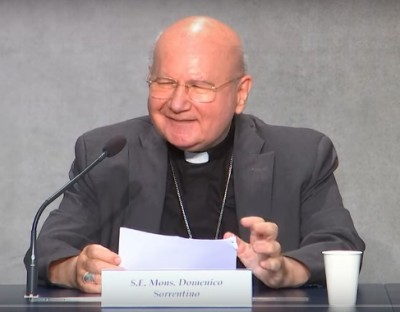 The full program of the three-day event, which will take place between the Lyrick Theater and the Palaeventi in Santa Maria degli Angeli and the historic center of Assisi, will focus on collecting the ideas and experiences generated around the world over the past three years of work. Speakers at the event include Vandana Shiva, Jeffrey Sachs, Kate Raworth, Gael Giraud, Sabina Alkire, Sister Helen Alford, Vilson Groh and Stefano Zamagni. There will be moments of sightseeing and knowledge of the city such as guided tours of the Basilica of St. Francis and that of St. Mary of the Angels, and the performance "The Dream" by guests of the Seraphic Institute will be offered. On Sept. 24, for the sixth time, Pope Francis returns to Assisi to meet with young economists, entrepreneurs and changemakers. It will be the highlight event of The Economy of Francis. The Holy Father will depart at 9 a.m. on the 24th from the Vatican's heliport and then land in the square near the Palaeventi and drive to the nearby Lyrick Theater in Santa Maria degli Angeli. Welcoming him outside will be three young people from EoF and Bishop Sorrentino, while inside the theater he will be greeted by Cardinal Michael Czerny, Prefect of the Dicastery for Promoting Integral Human Development, top civil authorities, members of the organizing committee, representatives of Franciscan families and Pro Civitate Christiana. The Pontiff, at 10 a.m., will reach the stage where, after an artistic-cultural moment, there will be a welcome, introduction and eight testimonies from young people from around the world. Following this, the Holy Father will deliver his address and sign the Covenant with the youth of EoF.
The full program of the three-day event, which will take place between the Lyrick Theater and the Palaeventi in Santa Maria degli Angeli and the historic center of Assisi, will focus on collecting the ideas and experiences generated around the world over the past three years of work. Speakers at the event include Vandana Shiva, Jeffrey Sachs, Kate Raworth, Gael Giraud, Sabina Alkire, Sister Helen Alford, Vilson Groh and Stefano Zamagni. There will be moments of sightseeing and knowledge of the city such as guided tours of the Basilica of St. Francis and that of St. Mary of the Angels, and the performance "The Dream" by guests of the Seraphic Institute will be offered. On Sept. 24, for the sixth time, Pope Francis returns to Assisi to meet with young economists, entrepreneurs and changemakers. It will be the highlight event of The Economy of Francis. The Holy Father will depart at 9 a.m. on the 24th from the Vatican's heliport and then land in the square near the Palaeventi and drive to the nearby Lyrick Theater in Santa Maria degli Angeli. Welcoming him outside will be three young people from EoF and Bishop Sorrentino, while inside the theater he will be greeted by Cardinal Michael Czerny, Prefect of the Dicastery for Promoting Integral Human Development, top civil authorities, members of the organizing committee, representatives of Franciscan families and Pro Civitate Christiana. The Pontiff, at 10 a.m., will reach the stage where, after an artistic-cultural moment, there will be a welcome, introduction and eight testimonies from young people from around the world. Following this, the Holy Father will deliver his address and sign the Covenant with the youth of EoF.
THE STATEMENTS
Giving the sense to chart the course of EoF was the Bishop of Assisi, Sorrentino: "We wish that this first meeting in presence, after three years of online work, would really serve to lay the foundations for a new economic culture. We 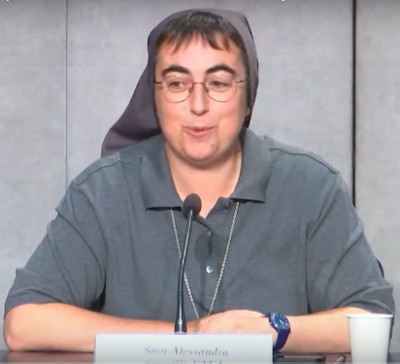 strongly believe that these young people, starting from the Covenant they will sign with the Holy Father, can from here on open a dialogue with the business world, banking institutions, large energy giants and centers of high finance. Through constructive dialogue and effective confrontation, one can really hope to change something. Assisi, from this point of view, represents a place-symbol, a city-message, a spiritual capital to weave this network of relationships, because before economic conversion comes human and relational conversion."
strongly believe that these young people, starting from the Covenant they will sign with the Holy Father, can from here on open a dialogue with the business world, banking institutions, large energy giants and centers of high finance. Through constructive dialogue and effective confrontation, one can really hope to change something. Assisi, from this point of view, represents a place-symbol, a city-message, a spiritual capital to weave this network of relationships, because before economic conversion comes human and relational conversion."
Satisfaction was expressed by Sister Alessandra Smerilli. "After so much waiting and so much long-distance work," she said, "it is a great joy for the Dicastery for Promoting Integral Human Development to finally be able to see gathered in Assisi young economists and entrepreneurs who want to engage in a pact to change the current economy, to give a soul to the economy of the future. The Economy of Francis is not an event: it is a process that is already underway, it is a set of initiatives, a worldwide network of young people, which will see in Assisi a public moment, and from there it will start again to continue in everyday life. Economy of Francis is bringing together the prophecy of 'Laudato si' and Fratelli Tutti,' and the courage to touch, to embrace poverty, like St. Francis of Assisi."
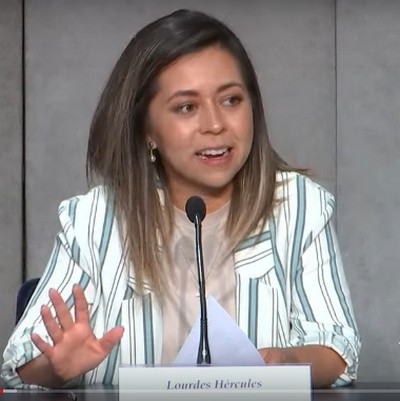 Speaking about the highlights of "The Economy of Francesco" was journalist Lourdes Hércules, who is on the organization's staff: "At the center of the first day are two important moments that we have called 'the harvest,' because they will allow us to see the steps we have taken in the last three years. Also planned are group work and networking where participants will be able to present their proposals and bring out new ones. Opportunities that young people will have begin first of all in the 12 thematic "villages." A space called "hogar" is also planned, to be of co-creation, meeting, confrontation made by young people for young people. Finally, the event concludes with a moment that looks to the future and commits us: a personal and collective pact between young people and with Pope Francis that will take place after a series of stories representing the life that revolves around EoF."
Speaking about the highlights of "The Economy of Francesco" was journalist Lourdes Hércules, who is on the organization's staff: "At the center of the first day are two important moments that we have called 'the harvest,' because they will allow us to see the steps we have taken in the last three years. Also planned are group work and networking where participants will be able to present their proposals and bring out new ones. Opportunities that young people will have begin first of all in the 12 thematic "villages." A space called "hogar" is also planned, to be of co-creation, meeting, confrontation made by young people for young people. Finally, the event concludes with a moment that looks to the future and commits us: a personal and collective pact between young people and with Pope Francis that will take place after a series of stories representing the life that revolves around EoF."
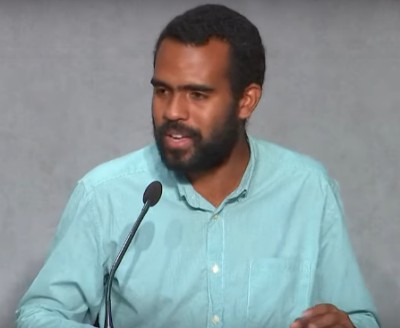 Introducing the "villages" was Tainã Santana, a business administration graduate from Brazil who also brought his testimony. "I am finishing my master's degree in economics here in Italy. I have always felt called by the cry of pain of humanity, especially in the poor and the little ones. In my city there are many homeless people, and this reality has never left me indifferent. During my undergraduate degree I was studying many beautiful aspects of economics and management, but I could not fully understand the meaning as I felt that the human component and a look toward the least of these was missing. When I heard about Pope Francis' invitation to give economics a soul, I felt it as something personal, and I looked for ways to get involved. The 1,000 young people in attendance will gather in the 12 thematic "villages" that will follow the virtual ones in which work has been done over the past two pandemic years: 1) Work and Care; 2) Management and Gift; 3) Finance and Humanity; 4) Agriculture and Justice; 5) Energy and Poverty; 6) Vocation and Profit; 7) Policies for Happiness; 8) CO2 of Inequality; 9) Business and Peace; 10) Women for Economy; 11) Business in Transition; 12) Life and Life-style."
Introducing the "villages" was Tainã Santana, a business administration graduate from Brazil who also brought his testimony. "I am finishing my master's degree in economics here in Italy. I have always felt called by the cry of pain of humanity, especially in the poor and the little ones. In my city there are many homeless people, and this reality has never left me indifferent. During my undergraduate degree I was studying many beautiful aspects of economics and management, but I could not fully understand the meaning as I felt that the human component and a look toward the least of these was missing. When I heard about Pope Francis' invitation to give economics a soul, I felt it as something personal, and I looked for ways to get involved. The 1,000 young people in attendance will gather in the 12 thematic "villages" that will follow the virtual ones in which work has been done over the past two pandemic years: 1) Work and Care; 2) Management and Gift; 3) Finance and Humanity; 4) Agriculture and Justice; 5) Energy and Poverty; 6) Vocation and Profit; 7) Policies for Happiness; 8) CO2 of Inequality; 9) Business and Peace; 10) Women for Economy; 11) Business in Transition; 12) Life and Life-style."
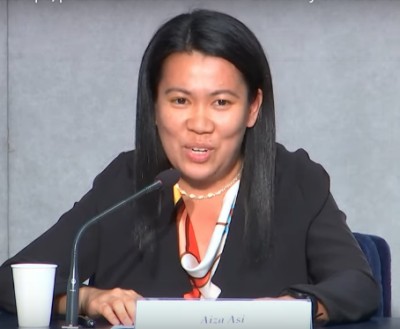 Providing insight into the youth of The Economy of Francis, however, was Aiza Asi, a doctoral student in economics and management. "The average age of the approximately 1,000 participants is 28 and they come from six continents. Three percent are from North America and Oceania, 8 percent from Asia, 10 percent from Africa, 31 percent from Latin America, and the rest from European countries. In terms of context, participants come from the three broad categories: enterprise, changemaker and research. Thirty percent come from the business world; they are, therefore, entrepreneurs, managers, and young people involved in start-up activities or even with defined and/or developing projects. Another 30% of the participants are engaged in research. The others (40 percent) are changemakers, that is, promoters of activities that serve the common good and a just, sustainable and inclusive economy in their respective communities."
Providing insight into the youth of The Economy of Francis, however, was Aiza Asi, a doctoral student in economics and management. "The average age of the approximately 1,000 participants is 28 and they come from six continents. Three percent are from North America and Oceania, 8 percent from Asia, 10 percent from Africa, 31 percent from Latin America, and the rest from European countries. In terms of context, participants come from the three broad categories: enterprise, changemaker and research. Thirty percent come from the business world; they are, therefore, entrepreneurs, managers, and young people involved in start-up activities or even with defined and/or developing projects. Another 30% of the participants are engaged in research. The others (40 percent) are changemakers, that is, promoters of activities that serve the common good and a just, sustainable and inclusive economy in their respective communities."
Finally, Giulia Gioeli, a doctoral student in Civil Economics, emphasized EoF's academic soul that "is one of the most important. In fact, an early project that came into being because of this presence is the EoF Academy, an international network of young scholars that was formed with the aim of conducting and promoting scholarly research on issues related to The "Economy of Francis." These 20 plus young scholars from more than 15 countries around the world have also been involved in the project organization of the event and will be key players in the program."
THE NUMBERS OF EoF
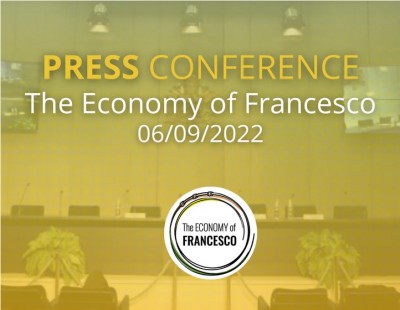 These are some figures related to EoF activities in the years 2020 and 2021. In summary, in these two years, two global online meetings with the virtual presence of Pope Francis were held and a new movement of economic thought and practice was born, involving more than 3,000 young economic scholars, entrepreneurs and changemakers from over 120 countries on 5 continents through a process of reflection, engagement and action on the major issues of economics, labor, finance, sustainability, and enterprise.
These are some figures related to EoF activities in the years 2020 and 2021. In summary, in these two years, two global online meetings with the virtual presence of Pope Francis were held and a new movement of economic thought and practice was born, involving more than 3,000 young economic scholars, entrepreneurs and changemakers from over 120 countries on 5 continents through a process of reflection, engagement and action on the major issues of economics, labor, finance, sustainability, and enterprise.
In detail:
2 live-streamed global online events with over 500,000 views and 2 video-messages that the Holy Father addressed to the young people of EoF:
https://francescoeconomy.org/it/l-evento/
https://francescoeconomy.org/it/evento2021/
A global commitment/appeal declined into 12 points:
https://francescoeconomy.org/it/main-stage/
12 international working groups: EoF villages
https://francescoeconomy.org/it/eof-villages/
Over 50 webinars and 50 internationally renowned experts - including 3 Nobel Laureates; 2 editions of the online EoF School and the first in-person Summer School. The EoF Academy with 18 researchers and more than 25 senior members:
https://francescoeconomy.org/it/eof-board/
Some entrepreneurial projects including: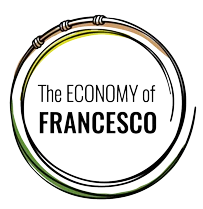
Farm of Francesco - Global Network of Regenerative, Agriculture Demo Farms
Pacar School - Education and technology as keys for a better future: we aim to elevate the level of technical schooling in Zambia to empower youths and develop local economies
https://francescoeconomy.org/eof-entrepreneurship/
Numerous scientific publications and 3 publishing projects, more than 500 regional events and initiatives
https://francescoeconomy.org/it/eof_hubs/
Numerous international collaborations, including one with FAO.

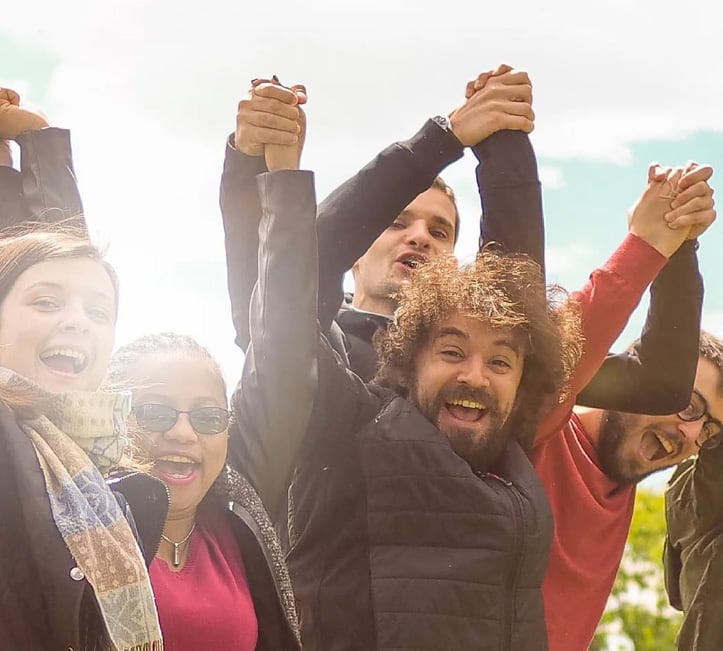
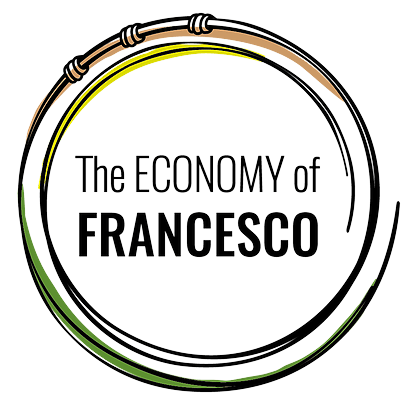
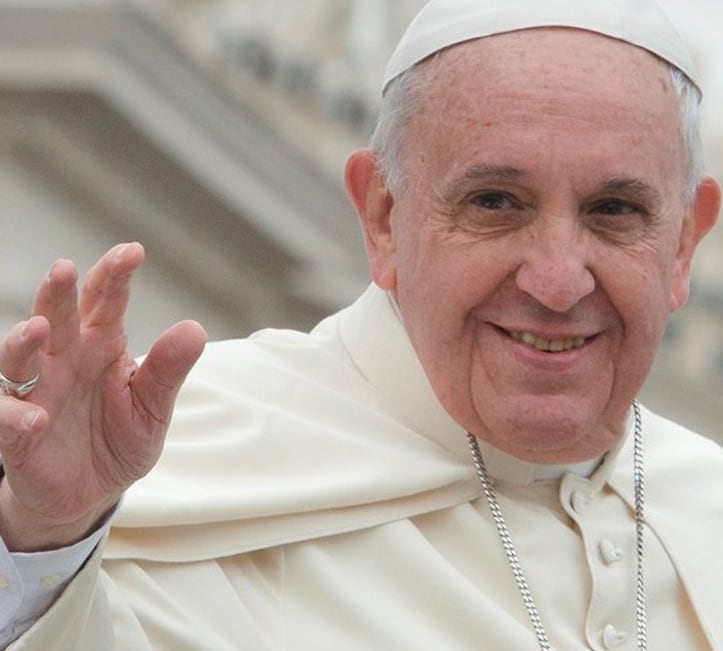
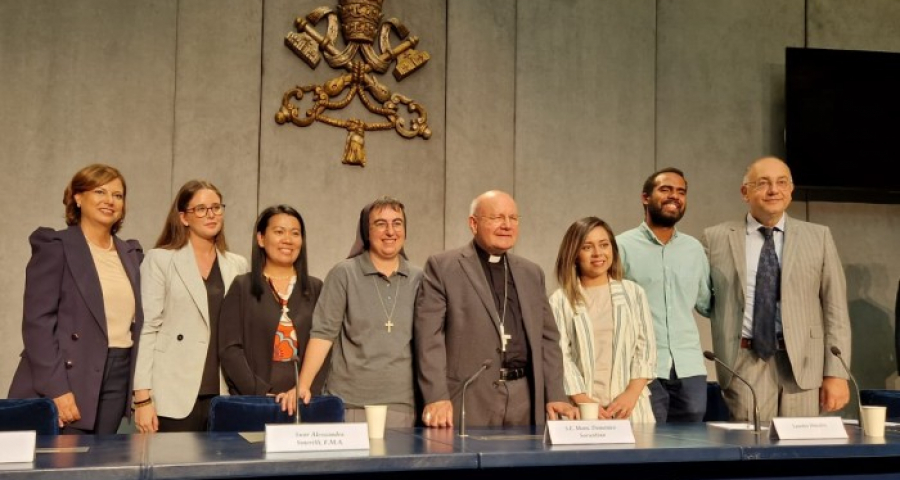
 “
“ The full program of the three-day event, which will take place between the Lyrick Theater and the Palaeventi in Santa Maria degli Angeli and the historic center of Assisi, will focus on collecting the ideas and experiences generated around the world over the past three years of work. Speakers at the event include Vandana Shiva, Jeffrey Sachs, Kate Raworth, Gael Giraud, Sabina Alkire, Sister Helen Alford, Vilson Groh and Stefano Zamagni. There will be moments of sightseeing and knowledge of the city such as guided tours of the Basilica of St. Francis and that of St. Mary of the Angels, and the performance "The Dream" by guests of the Seraphic Institute will be offered. On Sept. 24, for the sixth time, Pope Francis returns to Assisi to meet with young economists, entrepreneurs and changemakers. It will be the highlight event of The Economy of Francis. The Holy Father will depart at 9 a.m. on the 24th from the Vatican's heliport and then land in the square near the Palaeventi and drive to the nearby Lyrick Theater in Santa Maria degli Angeli. Welcoming him outside will be three young people from EoF and Bishop Sorrentino, while inside the theater he will be greeted by Cardinal Michael Czerny, Prefect of the Dicastery for Promoting Integral Human Development, top civil authorities, members of the organizing committee, representatives of Franciscan families and Pro Civitate Christiana. The Pontiff, at 10 a.m., will reach the stage where, after an artistic-cultural moment, there will be a welcome, introduction and eight testimonies from young people from around the world. Following this, the Holy Father will deliver his address and sign the Covenant with the youth of EoF.
The full program of the three-day event, which will take place between the Lyrick Theater and the Palaeventi in Santa Maria degli Angeli and the historic center of Assisi, will focus on collecting the ideas and experiences generated around the world over the past three years of work. Speakers at the event include Vandana Shiva, Jeffrey Sachs, Kate Raworth, Gael Giraud, Sabina Alkire, Sister Helen Alford, Vilson Groh and Stefano Zamagni. There will be moments of sightseeing and knowledge of the city such as guided tours of the Basilica of St. Francis and that of St. Mary of the Angels, and the performance "The Dream" by guests of the Seraphic Institute will be offered. On Sept. 24, for the sixth time, Pope Francis returns to Assisi to meet with young economists, entrepreneurs and changemakers. It will be the highlight event of The Economy of Francis. The Holy Father will depart at 9 a.m. on the 24th from the Vatican's heliport and then land in the square near the Palaeventi and drive to the nearby Lyrick Theater in Santa Maria degli Angeli. Welcoming him outside will be three young people from EoF and Bishop Sorrentino, while inside the theater he will be greeted by Cardinal Michael Czerny, Prefect of the Dicastery for Promoting Integral Human Development, top civil authorities, members of the organizing committee, representatives of Franciscan families and Pro Civitate Christiana. The Pontiff, at 10 a.m., will reach the stage where, after an artistic-cultural moment, there will be a welcome, introduction and eight testimonies from young people from around the world. Following this, the Holy Father will deliver his address and sign the Covenant with the youth of EoF. strongly believe that these young people, starting from the Covenant they will sign with the Holy Father, can from here on open a dialogue with the business world, banking institutions, large energy giants and centers of high finance. Through constructive dialogue and effective confrontation, one can really hope to change something. Assisi, from this point of view, represents a place-symbol, a city-message, a spiritual capital to weave this network of relationships, because before economic conversion comes human and relational conversion."
strongly believe that these young people, starting from the Covenant they will sign with the Holy Father, can from here on open a dialogue with the business world, banking institutions, large energy giants and centers of high finance. Through constructive dialogue and effective confrontation, one can really hope to change something. Assisi, from this point of view, represents a place-symbol, a city-message, a spiritual capital to weave this network of relationships, because before economic conversion comes human and relational conversion." Speaking about the highlights of "The Economy of Francesco" was journalist Lourdes Hércules, who is on the organization's staff: "At the center of the first day are two important moments that we have called 'the harvest,' because they will allow us to see the steps we have taken in the last three years. Also planned are group work and networking where participants will be able to present their proposals and bring out new ones. Opportunities that young people will have begin first of all in the 12 thematic "villages." A space called "hogar" is also planned, to be of co-creation, meeting, confrontation made by young people for young people. Finally, the event concludes with a moment that looks to the future and commits us: a personal and collective pact between young people and with Pope Francis that will take place after a series of stories representing the life that revolves around EoF."
Speaking about the highlights of "The Economy of Francesco" was journalist Lourdes Hércules, who is on the organization's staff: "At the center of the first day are two important moments that we have called 'the harvest,' because they will allow us to see the steps we have taken in the last three years. Also planned are group work and networking where participants will be able to present their proposals and bring out new ones. Opportunities that young people will have begin first of all in the 12 thematic "villages." A space called "hogar" is also planned, to be of co-creation, meeting, confrontation made by young people for young people. Finally, the event concludes with a moment that looks to the future and commits us: a personal and collective pact between young people and with Pope Francis that will take place after a series of stories representing the life that revolves around EoF." Introducing the "villages" was Tainã Santana, a business administration graduate from Brazil who also brought his testimony. "I am finishing my master's degree in economics here in Italy. I have always felt called by the cry of pain of humanity, especially in the poor and the little ones. In my city there are many homeless people, and this reality has never left me indifferent. During my undergraduate degree I was studying many beautiful aspects of economics and management, but I could not fully understand the meaning as I felt that the human component and a look toward the least of these was missing. When I heard about Pope Francis' invitation to give economics a soul, I felt it as something personal, and I looked for ways to get involved. The 1,000 young people in attendance will gather in the 12 thematic "villages" that will follow the virtual ones in which work has been done over the past two pandemic years: 1) Work and Care; 2) Management and Gift; 3) Finance and Humanity; 4) Agriculture and Justice; 5) Energy and Poverty; 6) Vocation and Profit; 7) Policies for Happiness; 8) CO2 of Inequality; 9) Business and Peace; 10) Women for Economy; 11) Business in Transition; 12) Life and Life-style."
Introducing the "villages" was Tainã Santana, a business administration graduate from Brazil who also brought his testimony. "I am finishing my master's degree in economics here in Italy. I have always felt called by the cry of pain of humanity, especially in the poor and the little ones. In my city there are many homeless people, and this reality has never left me indifferent. During my undergraduate degree I was studying many beautiful aspects of economics and management, but I could not fully understand the meaning as I felt that the human component and a look toward the least of these was missing. When I heard about Pope Francis' invitation to give economics a soul, I felt it as something personal, and I looked for ways to get involved. The 1,000 young people in attendance will gather in the 12 thematic "villages" that will follow the virtual ones in which work has been done over the past two pandemic years: 1) Work and Care; 2) Management and Gift; 3) Finance and Humanity; 4) Agriculture and Justice; 5) Energy and Poverty; 6) Vocation and Profit; 7) Policies for Happiness; 8) CO2 of Inequality; 9) Business and Peace; 10) Women for Economy; 11) Business in Transition; 12) Life and Life-style." Providing insight into the youth of The Economy of Francis, however, was Aiza Asi, a doctoral student in economics and management. "The average age of the approximately 1,000 participants is 28 and they come from six continents. Three percent are from North America and Oceania, 8 percent from Asia, 10 percent from Africa, 31 percent from Latin America, and the rest from European countries. In terms of context, participants come from the three broad categories: enterprise, changemaker and research. Thirty percent come from the business world; they are, therefore, entrepreneurs, managers, and young people involved in start-up activities or even with defined and/or developing projects. Another 30% of the participants are engaged in research. The others (40 percent) are changemakers, that is, promoters of activities that serve the common good and a just, sustainable and inclusive economy in their respective communities."
Providing insight into the youth of The Economy of Francis, however, was Aiza Asi, a doctoral student in economics and management. "The average age of the approximately 1,000 participants is 28 and they come from six continents. Three percent are from North America and Oceania, 8 percent from Asia, 10 percent from Africa, 31 percent from Latin America, and the rest from European countries. In terms of context, participants come from the three broad categories: enterprise, changemaker and research. Thirty percent come from the business world; they are, therefore, entrepreneurs, managers, and young people involved in start-up activities or even with defined and/or developing projects. Another 30% of the participants are engaged in research. The others (40 percent) are changemakers, that is, promoters of activities that serve the common good and a just, sustainable and inclusive economy in their respective communities." These are some figures related to EoF activities in the years 2020 and 2021. In summary, in these two years, two global online meetings with the virtual presence of Pope Francis were held and a new movement of economic thought and practice was born, involving more than 3,000 young economic scholars, entrepreneurs and changemakers from over 120 countries on 5 continents through a process of reflection, engagement and action on the major issues of economics, labor, finance, sustainability, and enterprise.
These are some figures related to EoF activities in the years 2020 and 2021. In summary, in these two years, two global online meetings with the virtual presence of Pope Francis were held and a new movement of economic thought and practice was born, involving more than 3,000 young economic scholars, entrepreneurs and changemakers from over 120 countries on 5 continents through a process of reflection, engagement and action on the major issues of economics, labor, finance, sustainability, and enterprise.






